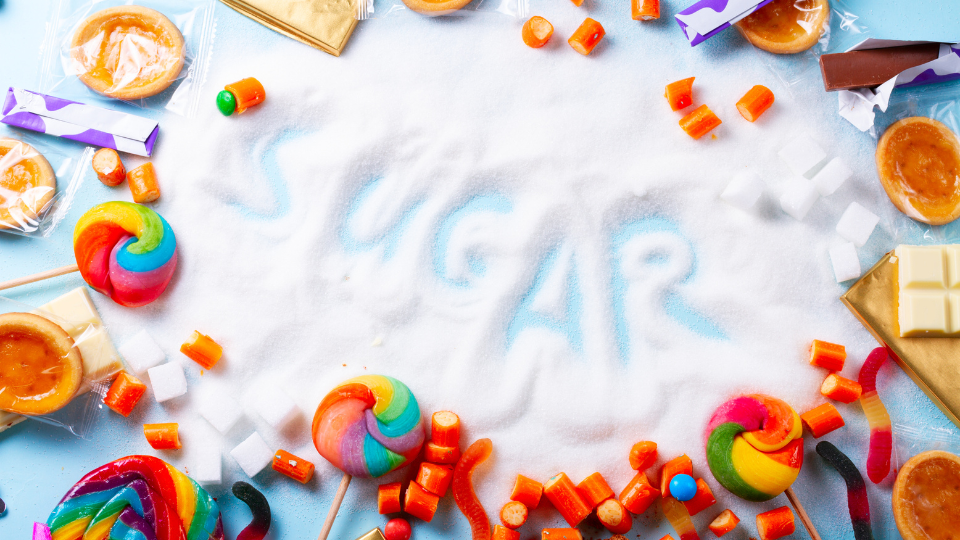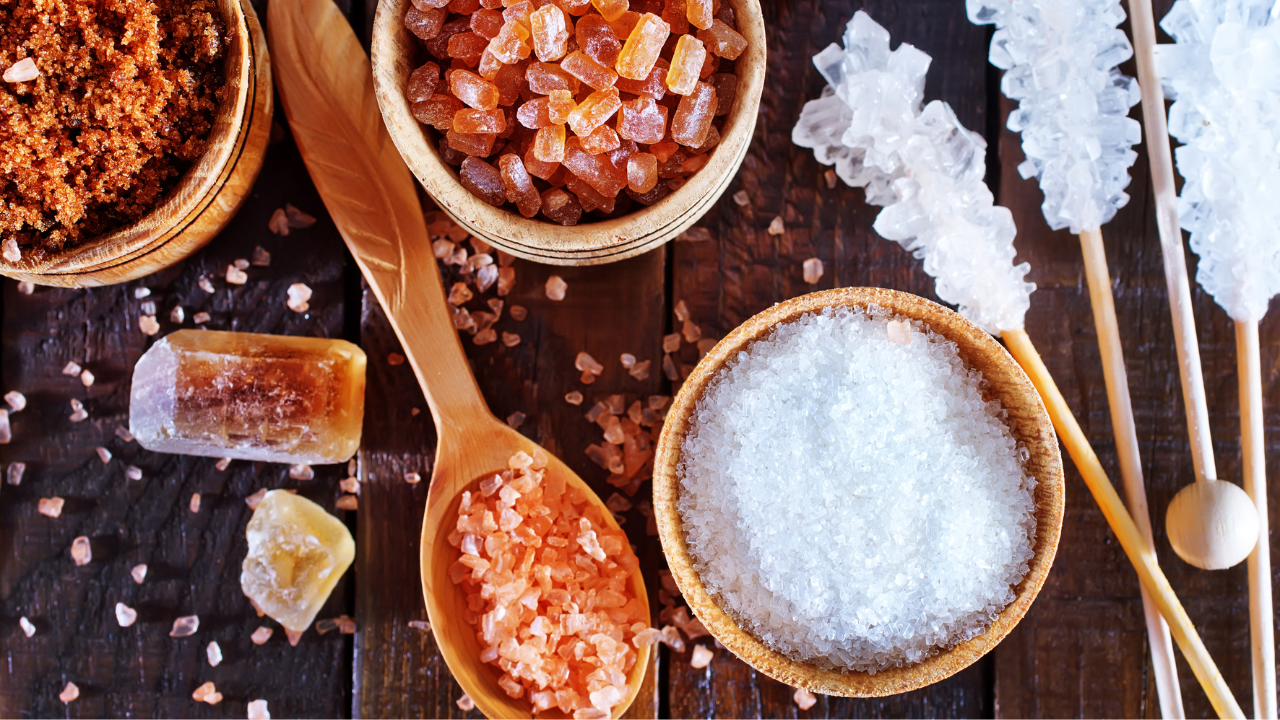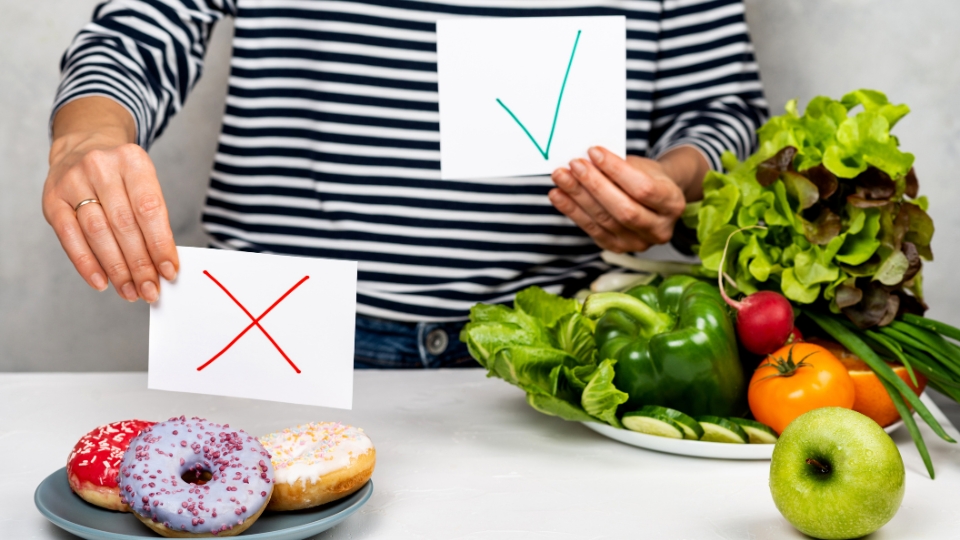Are you ready to conquer the sweet temptations that surround you? Imagine yourself as a fearless warrior equipped with the knowledge and tools to resist the siren call of sugar.
In this article, we will arm you with simple and effective strategies to help you avoid sugar and take control of your cravings. From practical tips to smarter living guides, we will empower you to make healthier choices for your overall well-being.
Get ready to embark on a new path toward wellness through meal planning and reading food labels like a pro. Together, let's create sustainable strategies for reducing sugar in our lives, switching to healthy wholesome sweeteners that add years to your life, and pave the way for a healthier future.
Remember, you are not alone in this quest; there is an entire community behind you who shares your desire for belonging and supports your journey toward freedom from excessive sugar consumption.
Key Takeaways
- Conquer sweet temptations and resist the siren call of sugar.
- Arm yourself with knowledge and tools to resist sugar.
- Incorporate whole foods to satisfy cravings and reduce sweet tooth.
- Prioritize plant-based whole food sweeteners and avoid packaged foods with high amounts of added sugars.
Tips for Reducing Sugar Intake
If you're looking to cut down on your sugar intake, there are several simple and effective strategies you can implement into your daily routine.
- The first step is to become aware of hidden sugars in your diet. Many processed foods and beverages contain added sugars that can quickly add up throughout the day. From familiar sweeteners like sugar, jaggery, honey, maple syrup to less known ones like high fructose corn syrup, sucralose, neotame, advantame, it's important to know the various forms of sugars that you should be avoiding for best health outcomes.
Start reading food labels and familiarize yourself with different names for sugar, such as sucrose, high fructose corn syrup, or dextrose. By being mindful of hidden sugars, you can make more informed choices about what you consume. - The second tip for reducing sugar intake is to limit sugary drinks. Sugar-sweetened beverages like soda, fruit juices, energy drinks, and sweetened teas are major sources of added sugars in many people's diets.
Opt for water or unsweetened herbal tea instead of reaching for these drinks when thirsty. If plain water seems boring, try infusing it with fresh fruits like lemon or berries for a natural hint of flavor. - The third tip is to lower your carvings for sugary foods. Try incorporating more whole foods into your diet that naturally satisfy cravings to combat this. Fruits like strawberries or grapes can taste sweet, offering fiber and essential nutrients.
Additionally, including fiber-rich snacks such as nuts or dry fruits between meals can help keep you feeling full and reduce the desire for sugary treats.
By implementing these tips into your daily routine, you can gradually reduce your sugar intake and break free from the grips of sugar addiction. Remember to be patient with yourself, as it takes time to adjust to new habits.
Understanding Sugar Consumption
One key to reducing excessive sugar intake is gaining a deeper understanding of the sweet temptations that lurk in our everyday diets. It's essential to recognize that not all sugars are created equal.
While natural sugars found in fruits can be part of a healthy diet, added sugars in processed foods and beverages can contribute to weight gain and other health issues.
To better understand sugar consumption, here are some key points to consider:
- Different names for added sugars: Added sugars can hide behind various names on ingredient lists, such as high-fructose corn syrup, cane sugar, agave nectar, or malt syrup. Being aware of these different names can help you identify hidden sugars in products.
- Sugar content in common foods: Many popular food items contain surprising amounts of added sugars. For example, breakfast cereals often have high levels of added sugars, even if they are marketed as healthy options. Checking nutrition labels and choosing lower-sugar alternatives can make a significant difference in your overall sugar intake.
- The impact on weight and calories: Consuming excessive amounts of added sugars can lead to weight gain due to their high-calorie content. Understanding this connection between sugar consumption and calorie intake is crucial for maintaining a healthy weight.
- Hidden sources of added sugars: Added sugars can be found not only in obvious sugary treats but also in many unexpected places like salad dressings, condiments, and even savory snacks. Paying attention to ingredient labels and opting for homemade or naturally sweetened alternatives whenever possible can help minimize your sugar intake.
- The importance of healthy consumption: While it may be tempting to cut out all forms of sugar completely from your diet, it's essential to remember that replacing added sugar with healthy sugar alternatives such as unfiltered date syrup, stevia, black molasses, dry fruits, or fresh fruits is more sustainable in the long run.
By being mindful of your overall sugar intake and making conscious choices about when and how much you indulge, you can still enjoy healthy sweet treats while maintaining a balanced diet such as a whole food plant-based diet.
Understanding the role that different types of sugars play in our diets is crucial for making informed choices about what we consume.
By familiarizing yourself with the various names for added sugars, being aware of hidden sources, and paying attention to sugar content in common foods, you can take steps towards reducing your overall sugar intake.
Remember that healthy whole food consumption is key, and by making small changes over time, you can achieve a healthier and more balanced diet.
Identifying Hidden Sugars
Discover the surprising sources of hidden sugars that may be sabotaging your efforts to maintain a healthier diet. It's easy to think that avoiding sugary snacks and desserts is enough, but there are many other foods and beverages that contain hidden sugars.
- Brown sugar, for example, might seem like a healthier alternative to white sugar, but it still spikes your blood sugar levels, adds empty calories and can contribute to weight gain.
- Soft drinks are another culprit, as they often contain high amounts of added sugars that can increase your risk of heart disease and negatively impact your overall health.
- Many processed foods, such as breakfast cereals or granola bars, may sound healthy but can actually have high levels of added sugars.
- Even savoury snacks and products may have hidden sugars right from chips, & fried snacks, to breads, & condiments
- Hidden sugars can affect your blood sugar levels. Consuming too much sugar at once can cause a spike in blood glucose levels followed by a crash later on, leaving you feeling tired and sluggish. Overtime, it can also lead to serious health consequences.
- It's not just sweets that contribute to this; even seemingly healthy options like fruit juice or flavored yogurt can contain large amounts of added sugars. Opting for whole fruits instead or choosing plain plant-based yogurt with fresh toppings allows you to enjoy natural sweetness without the negative effects on your blood sugar.
- Take the time to read the ingredient list carefully and look out for terms like sucrose, fructose, maltose, or dextrose - these are all types of sugars. By being aware of what you're consuming, you can make more informed choices about the foods you eat.
Understanding where hidden sugars come from is critical to avoiding them and maintaining a healthier lifestyle. By paying attention to food labels and opting for whole foods whenever possible, you can reduce your intake of added sugars and improve your overall health.
Making Healthier Food Choices
When it comes to selecting nourishing options for your meals, you'll find that prioritizing wholesome ingredients can have a positive impact on your overall well-being. Making healthier food choices is an essential step in avoiding excessive sugar consumption.
- One way to do this is by opting for foods and beverages that contain natural sugars instead of artificial sweeteners. Natural sugars, found in fruits and vegetables, are accompanied by fiber, vitamins, and minerals that promote good health. These foods provide a satisfying sweetness without causing a spike in blood sugar levels.
- Another strategy for making healthier food choices is to read labels carefully and pay attention to the grams of sugar listed. Many processed foods and drinks contain hidden sugars that can quickly add up throughout the day. By being mindful of the amount of sugar in your meal choices, you can better control your intake and make more informed decisions about what you eat.
- Instead of reaching for sugary snacks or desserts, stock up on sweet foods that are sweetened using healthy sweeteners like dates and dry fruits. You can get everything from cakes & cookies to traditional Indian sweets that are made using healthy sweeteners.
- Sweetened drinks such as soda, fruit juices, and energy drinks are notorious for their high sugar content. Instead, opt for water or unsweetened herbal tea as refreshing alternatives. If you prefer flavored beverages, consider infusing water with slices of citrus fruits or unfiltered date syrup or fresh fruits for natural sweetness without the excess sugar.
Also, discover the wholesome snacking options available at Sampoorna Ahara, including our B12 fortified flaxseed laddus, delectable oil-free baked goods, and a variety of whole food plant-based snacks and sweets, all designed to support your healthy snacking habits.
Furthermore, explore our extensive collection of 10 guilt-free dessert recipes that are not only delicious but also free from added sugars, making them too good to resist.
Meal Planning for Low Sugar Diet
To effectively plan meals for a low-sugar diet, prioritize whole foods and incorporate a variety of nutrient-dense ingredients that support optimal well-being.
- Start by filling your plate with fruits, vegetables, healthy proteins, and whole grains. These foods provide essential vitamins, minerals, and fiber while naturally being low in added sugars. Aim to include at least one serving of each food group in every meal to ensure a balanced diet.
- When meal planning for a low-sugar diet, it's essential to be mindful of hidden sugars in packaged foods. Check nutrition labels and avoid products with high amounts of added sugars or ingredients ending in "-ose"(such as sucrose or fructose). Instead, choose healthier options like fresh or frozen produce, unsweetened condiments, and minimally processed foods. By focusing on whole foods rather than processed ones, you can significantly reduce your intake of hidden sugars.
- Another helpful tip when planning meals is to limit sugary beverages and choose water or unsweetened drinks instead. Sugary drinks such as soda and fruit juices are loaded with empty calories from added sugars without providing any nutritional value. If you crave something flavorful, try adding slices of citrus fruits or herbs like mint or basil to your water for a refreshing twist. Additionally, consider using sugar substitutes like unfiltered date syrup if you need to sweeten your beverages without adding extra calories.
Meal planning plays a crucial role in maintaining a balanced diet free of added sugars and processed foods. Prioritize whole foods that are naturally low in added sugars and rich in nutrients..
Reading Food Labels
Be mindful of hidden sugars in your diet by reading food labels carefully - did you know that an average Indian consumes at least 10 spoons per day? It's a whooping 18 kg of sugar per year! Whereas the recommended intake shouldn't be beyond 5% of your daily calories intake, which is 6 teaspoons a day!
Reading food labels is an essential skill if you want to avoid excessive sugar consumption. When you pick up a packaged food item, make sure to check the nutrition facts label and the ingredient list.
- The nutrition facts label will give you an idea of how much sugar is in one serving, while the ingredient list will tell you where that sugar is coming from.
- It's essential to be aware that there are different names for sugar on food labels. Some common names include sucrose, high fructose corn syrup, dextrose, and maltose. By familiarizing yourself with these names, you can better identify sources of sugar in your favorite foods.
- Keep in mind that ingredients are listed in descending order by weight, so if sugar is one of the first few ingredients listed, it means there's a significant amount of it in the product.
- By reading food labels and being conscious of hidden sugars, you can make more informed choices about what goes into your body. Cutting down on refined sugar has numerous health benefits.
- It can help maintain stable blood sugar levels, reduce the risk of chronic diseases like obesity and diabetes, and improve dental health by preventing tooth decay.
So next time you're grocery shopping or reaching for a snack at home, take a moment to read the food label and make a choice that aligns with your health goals. Your body will thank you!
Sustainable Strategies for Sugar Reduction
Discover practical and sustainable ways to reduce your sugar intake while still enjoying your favorite treats. Making small changes in your daily routine can lead to significant improvements in your overall health.
Here are some effective strategies to help you on the path of sugar reduction:
- Swap sugary drinks for healthier alternatives: Instead of reaching for a soda or a sugary fruit juice, opt for water flavored with fresh fruits or herbs. You can also try unsweetened tea or sparkling water with a splash of citrus. These alternatives will quench your thirst without adding unnecessary sugars.
- Choose whole foods over processed ones: Processed foods often contain hidden sugars that can add up quickly. By opting for whole foods like fruits, vegetables, lean proteins, and whole grains, you'll not only reduce your sugar intake but also increase your nutrient intake. Whole foods are packed with essential vitamins, minerals, and fiber that promote overall health and prevent chronic diseases.
- Practice mindful eating: Mindful eating involves paying attention to the present moment while consuming food. By slowing down and savoring each bite, you become more aware of the flavors and textures of what you're eating. This practice helps you appreciate the natural sweetness in foods without relying on added sugars. Additionally, practicing mindfulness can help you tune into hunger cues and prevent overeating, which is beneficial for weight loss as well as overall nutrition.
Reducing sugar consumption is crucial for maintaining good health, as excessive sugar intake has been linked to various chronic diseases such as obesity, diabetes, heart disease, and tooth decay.
At Sampoorna Ahara, where you can indulge in a variety of delicious sweet treats like our B12 fortified flaxseed laddus, savor the goodness of oil-free baked treats, and explore an array of wholesome whole food plant-based snacks and sweets, all thoughtfully curated for your well-being.
While you're here, don't miss the chance to discover our exclusive compilation of 10 delightful no sugar dessert recipes that are simply too good to resist.
Frequently Asked Questions
Can consuming too much sugar lead to weight gain?
Yes, consuming too much sugar can lead to weight gain. In fact, studies show that people who consume more sugar are more likely to be overweight or obese. So it's important to watch your sugar intake for a healthier weight.
What are some common signs of sugar addiction?
Some common signs of sugar addiction include craving sugary foods, feeling irritable or moody without it, and experiencing withdrawal symptoms when cutting back. It's important to be aware of these signs and seek support if needed.
Are artificial sweeteners a healthier alternative to sugar?
Artificial sweeteners may seem like a healthier alternative to sugar, but research suggests they could have negative effects on your health. Instead, try natural alternatives like unfiltered date syrup, fruits, stevia and blackstrap molasses.
How does excessive sugar intake affect our mood and energy levels?
Excessive sugar intake can negatively impact mood and energy levels. It causes blood sugar spikes followed by crashes, leading to fatigue and mood swings. Reducing sugar consumption and replacing added sugar with healthier whole food options can help stabilize blood sugar levels, improving overall mood and energy.
What are some practical tips for dealing with sugar cravings?
To deal with sugar cravings, try distracting yourself with a healthy activity, drinking water or herbal tea, getting enough sleep, and managing stress. Remember, you could still enjoy sweet treats by replacing added sugars with healthier alternatives, while maintaining a balanced whole food plant-based diet.
Conclusion
In conclusion, you now possess the ultimate arsenal of sugar-fighting strategies that will transform your life and leave you feeling invincible. With these simple yet effective tips, you can conquer your cravings and take control of your health like never before.
By understanding the dangers of sugar consumption and identifying hidden sugars in everyday foods, you are equipped with the knowledge to make smarter choices for a healthier lifestyle.
Armed with this knowledge to navigate the treacherous world of sugary temptations and discover the art of making healthier food choices and mastering meal planning for a low-sugar diet, you'll no longer fall victim to sneaky food labels that try to deceive you.
And let's not forget about sustainability! These strategies aren't just short-term fixes; they provide long-lasting results that will keep your sugar intake under control for years to come.
Incorporating small changes everyday, opting for healthier sugar alternatives, and making a complete switch to a whole food plant-based diet is vital for your overall being.
You'll be amazed at how easy it is to incorporate these practical techniques into your daily routine while still enjoying delicious meals.
So go forth with confidence, armed with evidence-based knowledge and holistic solutions. Say goodbye to sugar's grip on your life and hello to a healthier, happier version of yourself. The power is in your hands, seize it now!
Next Steps
Congratulations! Now you have empowered yourself with the knowledge of overcoming sugar cravings through healthier dietary choices such as embracing a whole food plant-based diet.
For additional guidance in helping you embark this journey toward a better overall well-being,
- Book an online consultation with Dr. Achyuthan Eswar for a personalized medical consultation to prevent, treat and better manage lifestyle diseases through diet and lifestyle
- Learn to cook delicious whole food plant based goodies and sign up for courses on health and wellness from the comfort of you home. Join our online courses from anywhere in the world.
- Get daily essentials to cook healthy meals at home.
- Stock up on delicious sweets and snacks that are sugar/jaggery-free, oil-free, maida-free and plant-based - Available Pan-India.









